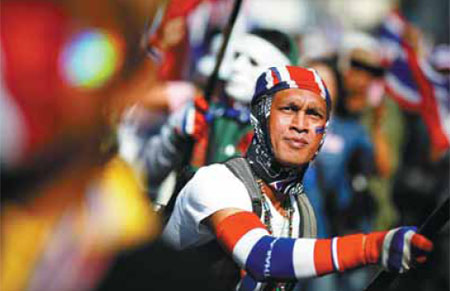Thai rice farmers threaten to support protesters
Some Thai rice farmers have threatened to switch sides and join protesters trying to topple the government if they do not get paid for their crops, a worrying development for Prime Minister Yingluck Shinawatra whose support is based on the rural vote.
Anti-government protests, now in their third month, have closed off parts of the capital in the latest installment of Thailand's eight-year political conflict that has seen sporadic outbreaks of violence.
In a sign of the impact on Southeast Asia's second-biggest economy, the Thai unit of auto giant Toyota Motor Corp said it might reconsider a planned $600 million investment, and even cut output, if the unrest drags on.
A scheme under which farmers are guaranteed an above-market price for their rice has been a centerpiece of the government's program, but as financing strains mount, some are complaining that they have been waiting three or four months to be paid.
Prom Boonmachoey, leader of a farmers' group in central Suphan Buri province, said a delegation was scheduled to visit lawyers on Tuesday. If there was no way to get compensation, thousands more would join the anti-government protests, he said.
"The Thai Lawyers Council is our consultant and it will help us file a lawsuit against the government," Prom told Reuters. If they cannot get payment, the farmers want their rice back so they can resell it, no matter how low the price, he said.
The protests in Bangkok pit the middle class and royalist establishment against the mainly poorer supporters of Yingluck and her brother, ex-premier Thaksin Shinawatra, who was toppled by the military in 2006.
Rural vote
The rural vote brought Yingluck's Puea Thai Party to power in 2011 with a sweeping populist platform.
But the rice program that formed part of it meant that Thailand, once the world's biggest rice exporter, was priced out of the global market. It left the country with a mountain of unsold grain and the government's intervention scheme running into funding problems.
Small protests have been popping up around the rice-growing regions in the center, north and northeast. The latter two are Puea Thai strongholds, a worry for Yingluck ahead of a general election she has called for Feb 2, and which the opposition has said it will boycott.
Her brother Thaksin is still adored by many in the countryside for the policies he introduced such as cheap healthcare and loans for businesses in the villages, and he is seen as the power behind Yingluck's government.
He has chosen to live in exile in Dubai rather than serve a prison sentence for abuse of power handed down in 2008. The protests in Bangkok since November were sparked by a government attempt to force through a broad political amnesty that would have allowed him to return home a free man.
Although the protests have been mostly peaceful, violent incidents are picking up.
A man was killed and dozens of people were wounded, some seriously, when grenades were thrown at anti-government protesters in the city center on Friday and Sunday.
Thailand's government on Tuesday declared a state of emergency in Bangkok and surrounding areas to cope with protests that have stirred up violent attacks.
Labor Minister Chalerm Yubumrung announced that the measure will take effect on Wednesday and continue for 60 days.
The emergency decree greatly expands the power of security forces to issue orders and search, arrest and detain people, with limited judicial and parliamentary oversight.
Reuters - AP
|
An anti-government protester marches through Bangkok's financial district on Tuesday. Some Thai farmers have threatened to join anti-government protesters if they do not get paid for their crop. Damir Sagolj / Reuters |
(China Daily 01/22/2014 page12)









